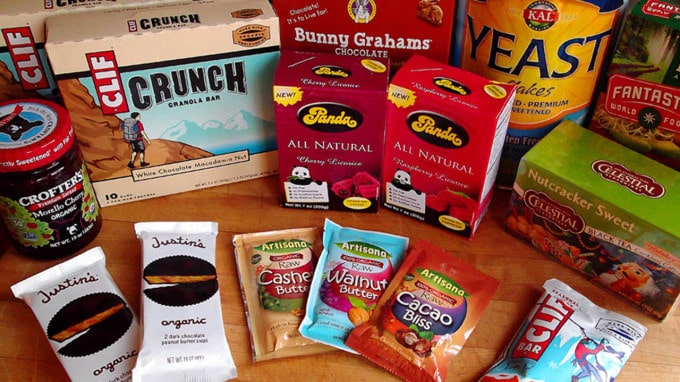What makes a food or product suitable for vegans?
It must not contain animal products or by-products, and it must not be tested on animals.
Any unprocessed plant food is vegan, this includes fruit, vegetables, nuts, seeds, beans, and legumes.
How to tell if a packaged food is vegan
Vegan labeling
Start by scanning the products label and packaging. Due to the rise of veganism in recent years more and more products are being labeled as vegan. Look for products that say "Suitable for Vegans" or have the "Certified Vegan" logo.
Allergen information
Find the allergy information of a product by looking near the very bottom of it's ingredient list. If the product contains milk ingredients, eggs, or shellfish it will plainly say, “Contains milk, eggs, shellfish”. This doesn’t work so well for products containing meat, but it will quickly tell you whether or not it's worth reading the whole ingredients list or not.
Read the ingredients
There are many by-products derived from animals which can cause some confusion at first, for example; whey powder, casein, and modified milk ingredients are all dairy products. Don’t let that scare you! You’ll be amazed at how quickly you learn what ingredients to avoid, it’s nothing to sweat over, you’ll learn it all in time!
How to tell if personal care items and cosmetics are cruelty-free and vegan
Vegan labeling & Ingredient lists
Start by scanning the product's label and packaging. Look for products that have the "Certified Vegan" logo. If the product is simply labeled "vegan" or "contains no animal ingredients" do not take that as a guarantee, read the full ingredient list and find out for yourself. Make good use of vegan/cruelty-free product lists that are easily found online, it's a lot easier to do research at home than trying to understand some of the unregulated terms used in packaging. PETA has a good resource for finding vegan personal care products.
Animal Testing
Look for items labeled with the Coalition for Consumer Information on Cosmetics (CCIC) leaping bunny logo or PETA's cruelty free bunny logo.
Some products may be labeled as "Cruelty Free" or "Not tested on animals" but these terms are not regulated. Your best bet is to utilize the shopping guides provided by the CCIC and PETA for products that are guaranteed to use no animal testing. Keep in mind that products that aren't tested on animals and vegan products are not necessarily mutually exclusive - for example some cosmetics may be "cruelty free" (not tested on animals) but may contain animal derived ingredients.
Common animal derived ingredients
There are some very comprehensive lists of animal by-products and all of their different names online, a quick google search should pull up a whole bunch of them (PETA has a very thorough list of animal derived ingredients) These lists can be a bit overwhelming for someone that's new to veganism, here are some examples of the more common ingredients to watch out for (not including the obvious such as “eggs”, “milk”, “beef fat”, etc.)
Food
Albumen, bone char, butter fat, carmine, casein, gelatin, lactose, lard, l-cysteine, mono and di-glycerides, shellac, vitamin D3, whey powder
Personal care products and cosmetics
Beeswax, castor oil, lanolin, keratin, musk, pearls, tallow
Apparel and textiles
Leather, fur, silk, wool, cashmere, angora
To add to the confusion there are many ingredients that can be plant based or animal based. For those ingredients you’ll often have to contact the manufacturer directly to find out where they source the ingredient from, or check online, someone else may have already found the answer.
Continue to "Veganism on a Budget" →
Questions? Submit a Question or Visit our FAQ.


Leave a Reply